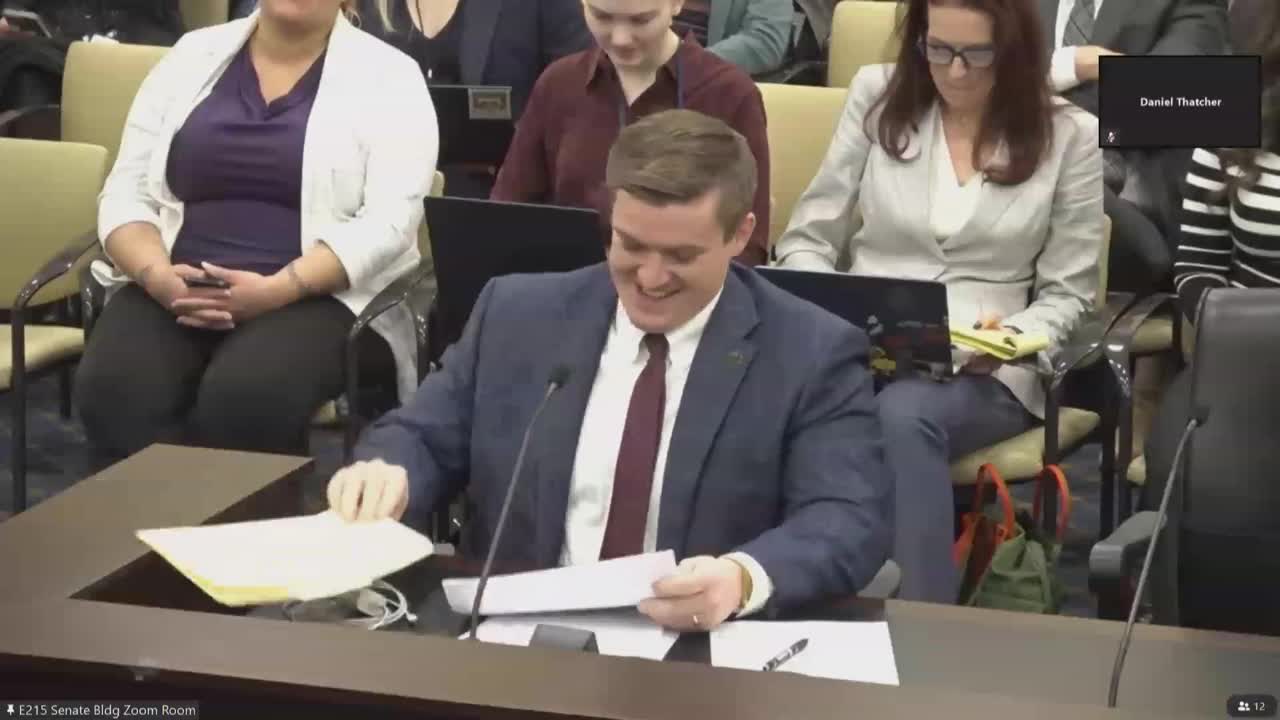Committee advances broad opioid and substance-use bill with harm-reduction and enforcement changes
February 25, 2025 | 2025 Utah Legislature, Utah Legislature, Utah Legislative Branch, Utah
This article was created by AI summarizing key points discussed. AI makes mistakes, so for full details and context, please refer to the video of the full meeting. Please report any errors so we can fix them. Report an error »

A Senate committee on Feb. 20 favorably recommended House Bill 199, a comprehensive package of changes to Utah’s substance-use policy that combines harm-reduction regulation, expanded treatment options and updates to nuisance and enforcement tools.
Sponsor’s overview: the bill sponsor described HB 199 as the product of a long collaborative process intended to “hit every step of the way for our drug policy in Utah.” Key provisions spelled out in committee testimony include inserting harm-reduction pathways and mission language into statute; prohibiting supervised injection facilities; restricting delivery of needle-exchange supplies to homeless shelters and permanent supportive housing; expanding overdose-response options to link first responders to immediate treatment pathways; and piloting mobile medication‑assisted‑treatment (MAT) clinics aimed at homeless populations and rural residents.
Public and stakeholder input: Criminal-justice and harm-reduction groups testified in support. Elizabeth Kelch, criminal-justice policy director at the Commission on Criminal and Juvenile Justice (CCJJ), and Stephanie Ammit of the Utah Harm Reduction Coalition said the measure improves pathways to recovery. A representative of the Cicero Institute cited national overdose trends to support the bill’s broader treatment and regulation strategies.
Committee action: Senator Plumb moved that the committee favorably recommend the second substitute of HB 199 to the full Senate. The committee voted to pass the bill favorably to the Senate; the committee record shows a unanimous committee vote in favor of the substitute as presented.
What the bill changes: among other items, HB 199—
- Adds statutory language to recognize harm reduction as a pathway to recovery and aligns program goals with best practices;
- Prohibits supervised injection sites and restricts needle-exchange delivery in certain residential settings;
- Mandates improved overdose-response linkages so first responders can offer immediate treatment options after reversal using naloxone/Narcan;
- Enables and funds mobile MAT clinics to reach homeless and rural populations;
- Updates nuisance law definitions so statutes better reflect modern drug-related disorder patterns.
Next steps: committee members advanced the second substitute with a favorable recommendation to the full Senate.
Sponsor’s overview: the bill sponsor described HB 199 as the product of a long collaborative process intended to “hit every step of the way for our drug policy in Utah.” Key provisions spelled out in committee testimony include inserting harm-reduction pathways and mission language into statute; prohibiting supervised injection facilities; restricting delivery of needle-exchange supplies to homeless shelters and permanent supportive housing; expanding overdose-response options to link first responders to immediate treatment pathways; and piloting mobile medication‑assisted‑treatment (MAT) clinics aimed at homeless populations and rural residents.
Public and stakeholder input: Criminal-justice and harm-reduction groups testified in support. Elizabeth Kelch, criminal-justice policy director at the Commission on Criminal and Juvenile Justice (CCJJ), and Stephanie Ammit of the Utah Harm Reduction Coalition said the measure improves pathways to recovery. A representative of the Cicero Institute cited national overdose trends to support the bill’s broader treatment and regulation strategies.
Committee action: Senator Plumb moved that the committee favorably recommend the second substitute of HB 199 to the full Senate. The committee voted to pass the bill favorably to the Senate; the committee record shows a unanimous committee vote in favor of the substitute as presented.
What the bill changes: among other items, HB 199—
- Adds statutory language to recognize harm reduction as a pathway to recovery and aligns program goals with best practices;
- Prohibits supervised injection sites and restricts needle-exchange delivery in certain residential settings;
- Mandates improved overdose-response linkages so first responders can offer immediate treatment options after reversal using naloxone/Narcan;
- Enables and funds mobile MAT clinics to reach homeless and rural populations;
- Updates nuisance law definitions so statutes better reflect modern drug-related disorder patterns.
Next steps: committee members advanced the second substitute with a favorable recommendation to the full Senate.
View full meeting
This article is based on a recent meeting—watch the full video and explore the complete transcript for deeper insights into the discussion.
View full meeting

